Learn How To Manage Your Rental Property on Airbnb
Get access to our 5-day training course on managing your vacation rental property in Dubai.
Download GuideWith over 5 million hosts and 1.5 billion guests, Airbnb commands a major part of the vacation rental market.
For guests looking to book a short stay, or hosts looking to put up a place for some passive income, Airbnb remains a great choice.
However, many hosts and guests are increasingly looking for lower prices, better support and improved services. And as your favorite property management company, we had to dig up the best Airbnb alternatives in 2026.
Whether you want to book a short stay or jump into the holiday homes business, here are other vacation rental platforms worth checking out in 2026:
Now, let’s examine each of these Airbnb competitors in detail 🙂
Hosts and guests are on the hunt for the best Airbnb alternatives. There are plenty of “whyyyyyssss” for that, but here’s the real deal:
| Reasons | Why it Matters for Hosts | Why it Matters for Guests |
| Saving Costs | Airbnb’s ‘host-only fee’ of 20% can reduce your profit. A lower fee platform means higher earnings for hosts. The 3% split fee seems fair but not for guests. | Airbnb’s 14.2% guest fee makes guest stays costly. |
| Reducing Dependence on One Platform | Airbnb suspension means two things: no bookings and no income flow. So it’s better to have an alternative platform in case anything goes wrong. | Browsing other listings elsewhere gives you more choices and better prices. |
| Finding the Right Audience or Stay | Listing on “niche” platforms attracts guests who are willing to pay for premium rates for a premium experience. | Booking on niche platforms gives you a better experience – tailored to your needs (luxury, budget, pet-friendly). |
| Increasing Visibility and Bookings | Relying on a single platform limits audience reach, and this plays a role in occupancy rates. | Having more options means you’ll get more availability and better accommodation. |
| Avoiding Strict Policies | Airbnb’s policies often favor guests; like flexible cancellation refunds, leaving hosts at risk. Some alternatives provide better protection. | Some cities restrict Airbnb listings, so other hosting sites may have fewer legal issues. |
Here are the top 5 Airbnb alternatives to consider in 2026 and beyond.
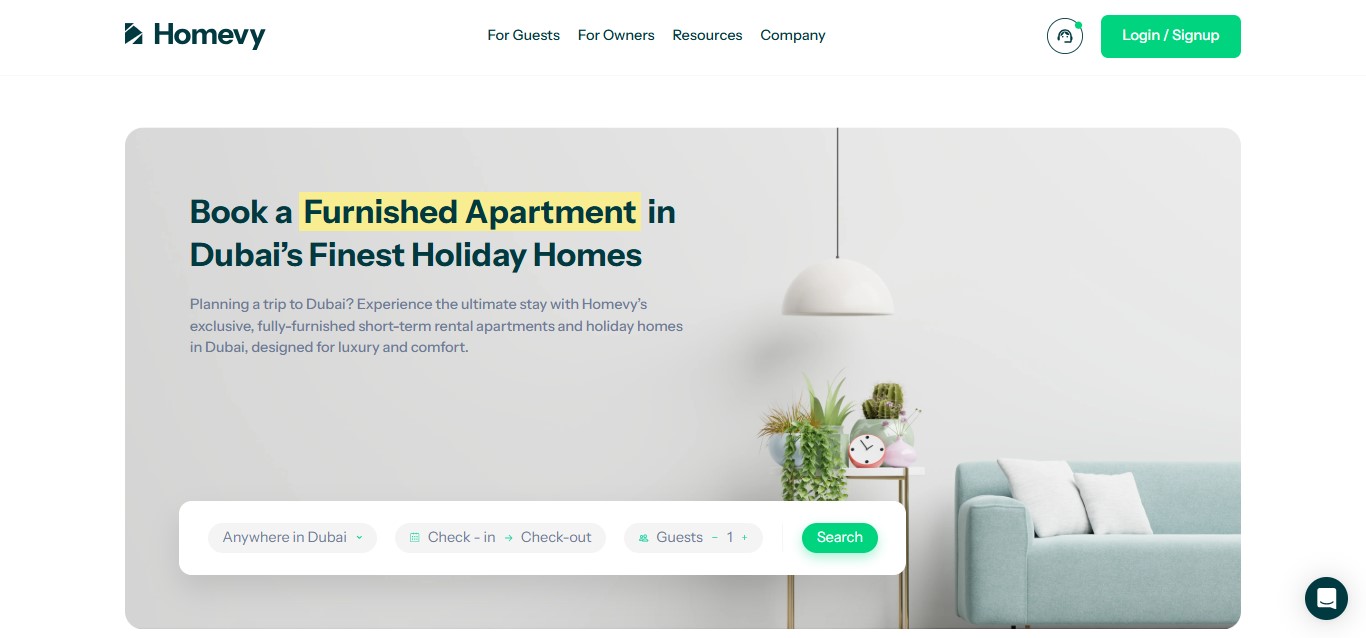
With an average 85% occupancy rate, 100% owner satisfaction and astounding 5-star guest reviews, Homevy is your best Airbnb alternative for both guests and hosts. Homevy ranks among the best property management companies in Dubai, helping property owners increase earnings, while giving guests a true ‘home away from home’ experience.
As a homeowner, you get to enjoy the following when Homevy lists your property on their platform:
…and many more.
Sounds good? We know it does.
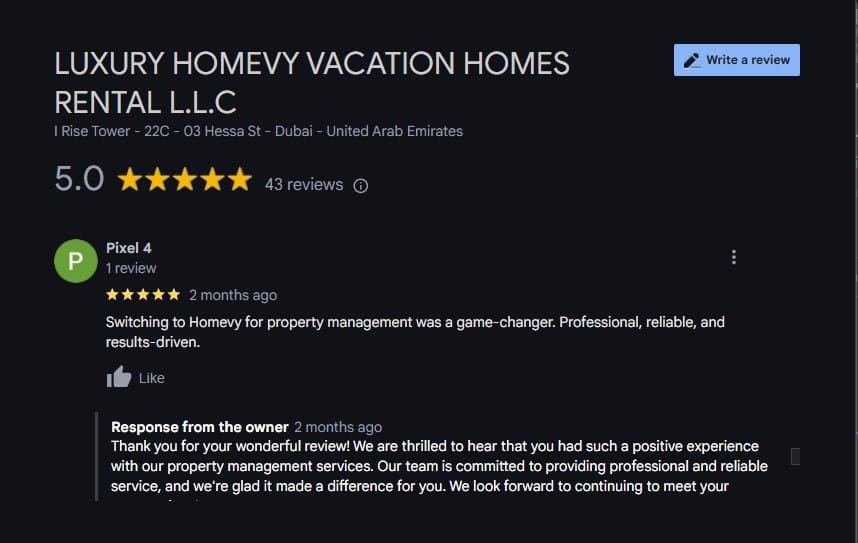
Source: Homevy’s Google Profile
Unlike Airbnb’s do-it-yourself approach, Homevy’s full-service management means hosts earn more while doing less (or nothing). You only sit back and watch the bookings come in. Guests also get to enjoy no Airbnb’s 14.2% service fee – whenever they book directly from the Homevy website. Simply book your stay and enjoy Homevy’s all-inclusive services.
Homevy also goes above and beyond to create unforgettable guest experiences.
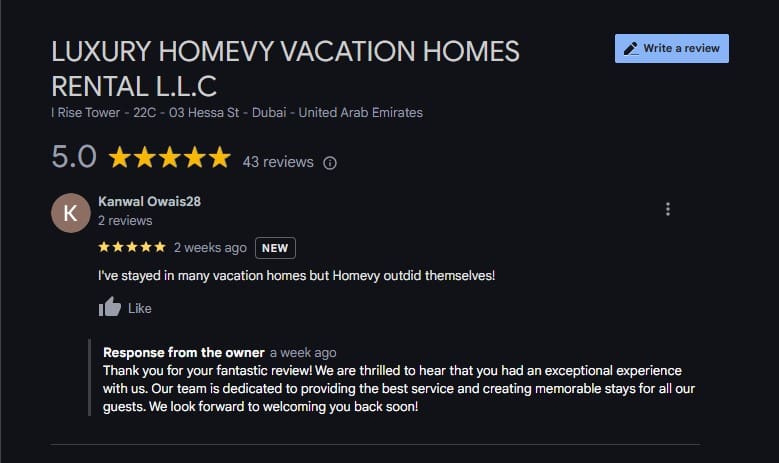
Source: Homevy’s Google Profile
Who Homevy is Best For: Hosts looking for profitable holiday home management, multiple platform listings, and guests who want a comfortable, smooth stay without extra service fees.
Vrbo is another Airbnb alternative with a key difference – the types of properties they offer.
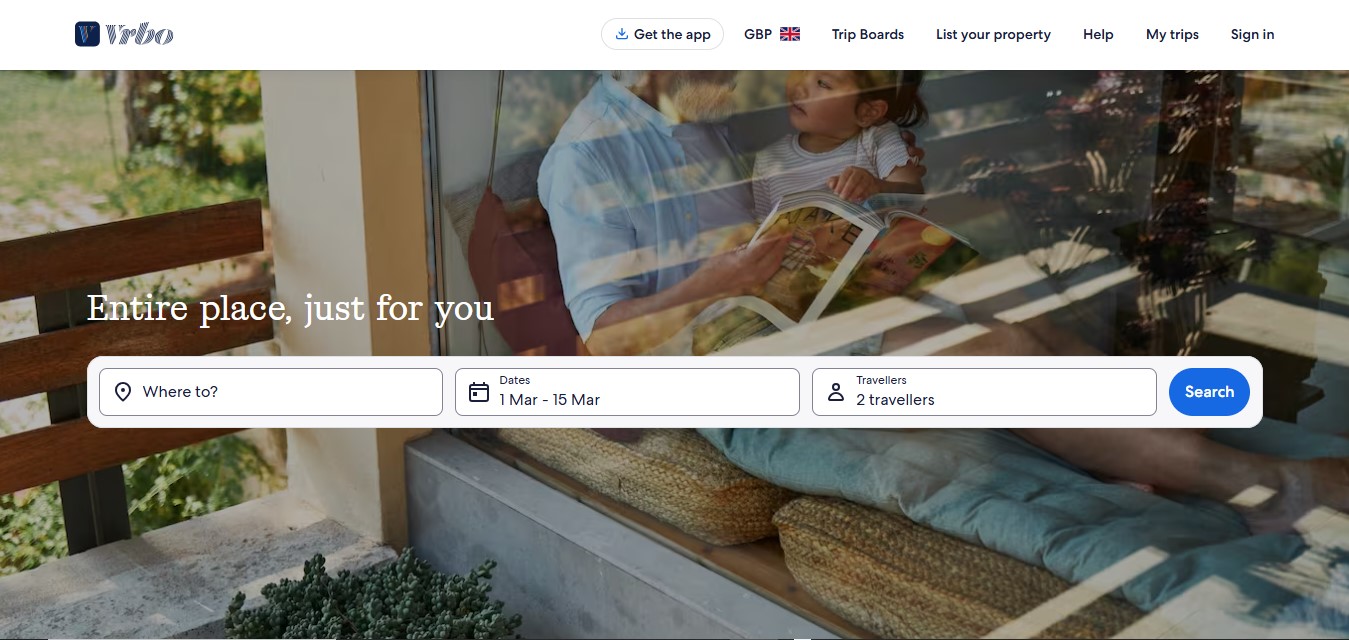
With about 2 million vacation rental properties worldwide, Vrbo stands out by offering larger accommodations for groups and families, compared to Airbnb, where you might end up sharing a space with the host (or their cat).
Vrbo charges guests a service fee based on a percentage of the total reservation amount. The higher the reservation amount, the lower the service fee rate. This is also a win for hosts, as they get to choose between an 8% pricing fee per booking or an annual fee of $499.
| Pros | Cons |
| Perfect for long-term stays. | Budget travelers looking for a private room may have to look elsewhere. |
| Flexible pricing for hosts. | The $499 fee is fair for hosts with consistent bookings; however, it’s a drawback for those with fewer reservations. |
| Suitable for families and groups. | Has a smaller audience due to the specific niche. |
| Host-friendly platform. | Guests often find it tough to resolve issues with Vrbo’s customer support. |
Who VRBO is Best For: Hosts who offer entire vacation homes, especially those with a target audience of “families.” The Vrbo platform is also great for guests planning reunions, vacations, or large trips – where everyone wants to stay under one roof.
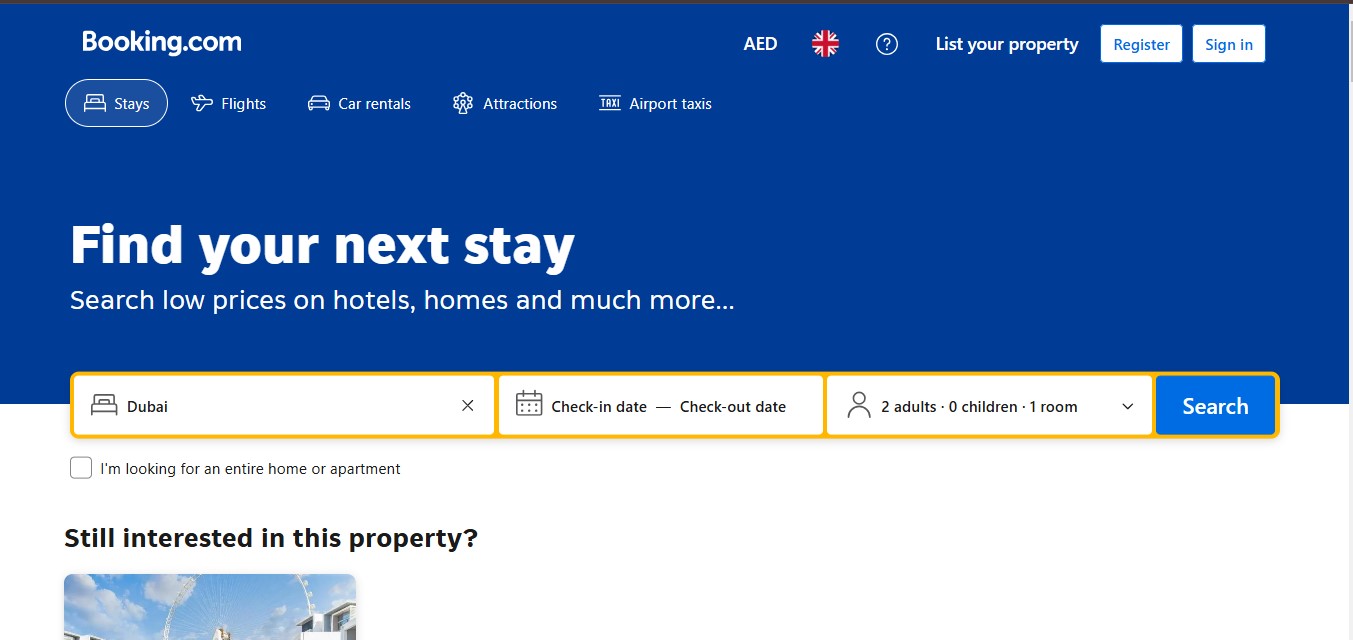
Booking.com is a global travel platform primarily known for hotel bookings. However, it has expanded into holiday homes and short-term rentals across over 220 countries, making it a strong Airbnb alternative.
The best part of listing with booking.com is that your property gets in front of millions of travelers daily, which increases your chances of high occupancy. However, the platform charges a 20% commission per booking.
| Pros | Cons |
| Large audience – as at 2024, Booking.com had over 514 million visits, making it the world’s most visited travel and tourism website. | Booking.com charges hosts a 10-25% commission per booking, which can be quite high. |
| High visibility – hosts get access to international travelers. | There’s often little or no interaction with the host. |
| No service fee for guests. | Since vacation rentals are listed alongside hotels, guests might have unrealistic expectations. |
| Easy booking. | Instant booking makes it easier for guests but takes away the host’s ability to screen guests beforehand. |
| Guests have access to attractions and experiences during their stay. | The platform was originally built for hotels, so other accommodations, especially new short-term rental hosts, may find it difficult to navigate. |
Who Booking.com is Best For: Hosts who want global visibility and a consistent flow of bookings, and guests who prefer quick reservations with no extra service fees.
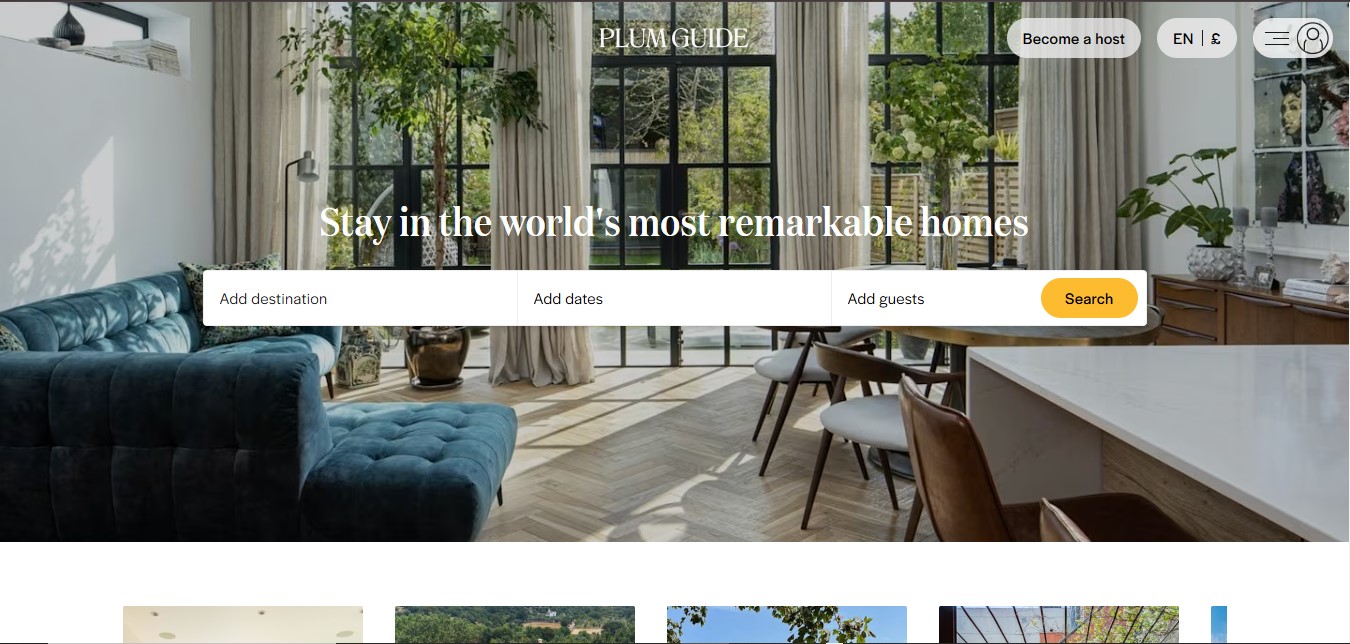
In an interview, Plum Guide’s co-founder Arif Meherali stated their commitment to quality: “We have taken an OCD approach to scanning over 30,000 homes, testing those that qualify and accepting only about 1 in every 100 we look at.”
From the statement, you can tell Plum Guide is a luxury Airbnb alternative. “If you book with Plum, it’s guaranteed to be awesome, full stop,” he mentioned. But you know how that goes – luxury comes at a price. So as a guest, you’re to pay a 12% service fee, unless the host covers it.
Another thing that makes Plum Guide a solid Airbnb competitor is the “Home Truths” in each listing. This section provides candid insights about a property. As a result, guests have the right expectations before booking. For example, in a Business Bay rental, Plum Guide notes:
“The balcony is not furnished with any seating”
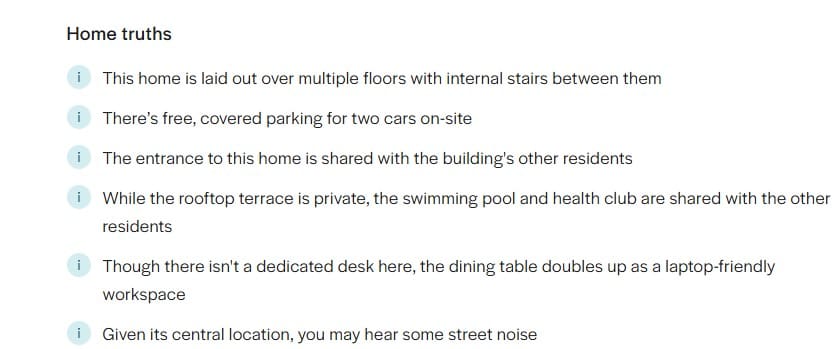
Source: Plum Guide’s Website
This kind of transparency makes Plum Guide a solid alternative to Airbnb, both for hosts and guests.
| Pros | Cons |
| Attracts high-quality guests willing to spend on luxury stays. | Strict selection process for hosts. |
| The ‘Home Truths’ section provides transparency on each listing, specifically helping guests make an informed decision before choosing a home. | If you’re traveling on a budget, look elsewhere. |
| Boosts your property credibility as a host. | Guests pay around 12% in service fees unless covered by the host. Meanwhile, hosts face 16.5%-18.5% fees with host-only pricing, plus a one-time $400 onboarding fee. |
Who Plum Guide is Best For: Hosts who own high-end properties and want to attract guests who are willing to pay for quality. And for guests who prioritize luxury, and exclusivity.
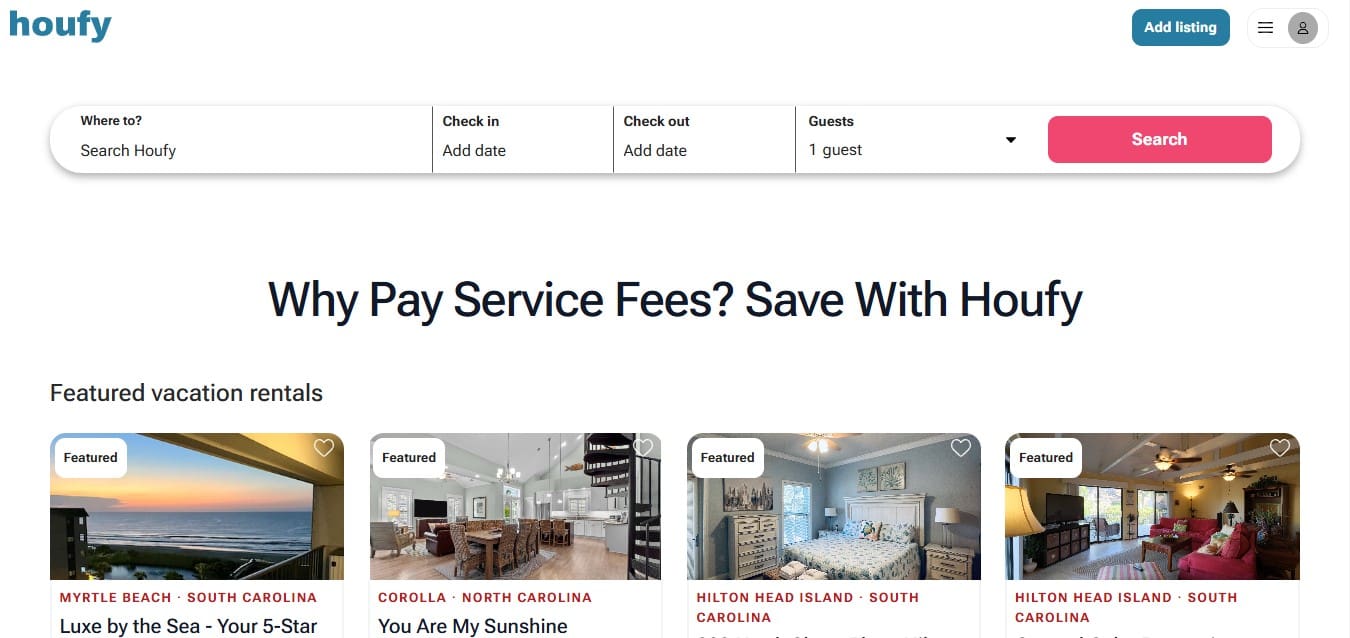
Houfy (short for “House For You”) is the Airbnb alternative that puts control back in the hands of hosts. Unlike other platforms that take a cut from every booking, Houfy allows property owners to list and manage their rentals without paying any commission fees. Yes, that means 0% booking fees for hosts and guests.
The downside is that since it’s a direct booking platform, guests must communicate with hosts for payments, which might not be as seamless as other mainstream platforms.
| Pros | Cons |
| There are no commission fees, the hosts get all the profits, and guests pay no costs. | Limited global reach. |
| Hosts set their own terms, policies, and pricing. | More responsibility for hosts in terms of marketing and managing. |
Who Houfy is Best For: Hosts who want to avoid commission fees and guests looking for lower prices without extra service fees.
You don’t have to ditch Airbnb because you know its competitors. The smart move is to expand your listings across multiple platforms. This is a major strategy for vacation rental success.
With this in mind, here are some boxes to tick before choosing from the 5 Airbnb alternatives we’ve shared in this article.
If you’ve ticked 4-5 boxes, congratulations! You’ve found the right Airbnb alternative.
Vrbo is Airbnb’s biggest competitor, specializing in entire vacation homes for families and groups. Similarly, other top alternatives like Booking.com, Plum Guide, and Houfy also stand out, each catering to different traveler and host needs.
Websites like Vrbo, Booking.com, Plum Guide, Houfy, and Homevy provide vacation rental services similar to Airbnb. Each platform has unique features, such as no service fees (Houfy), luxury handpicked homes (Plum Guide), and high exposure for hosts (Booking.com).
The best vacation rental platform depends on your needs. Vrbo is great for families, Booking.com offers global reach, Plum Guide ensures luxury stays, Houfy allows commission-free direct bookings, and Homevy provides full-service property management in Dubai.
Yes, Airbnb operates in over 220 countries, with the U.S. having the highest demand.
Airbnb is considered an Online Travel Agency (OTA). OTAs are digital platforms that act as intermediaries between hosts and travelers seeking accommodation. Airbnb connects property owners with guests looking for short-term rentals online.
Choosing the right vacation listing platform depends on what matters most to you as a host or guest.
Here is a quick look at the best alternatives to Airbnb:
If Airbnb isn’t ticking all your boxes as a host or guest, then exploring these alternatives could help you find a better fit. After all, the more, the merrier.
Xoxo, Gossip Homevy girl 🙂
Get access to our 5-day training course on managing your vacation rental property in Dubai.
Download Guide